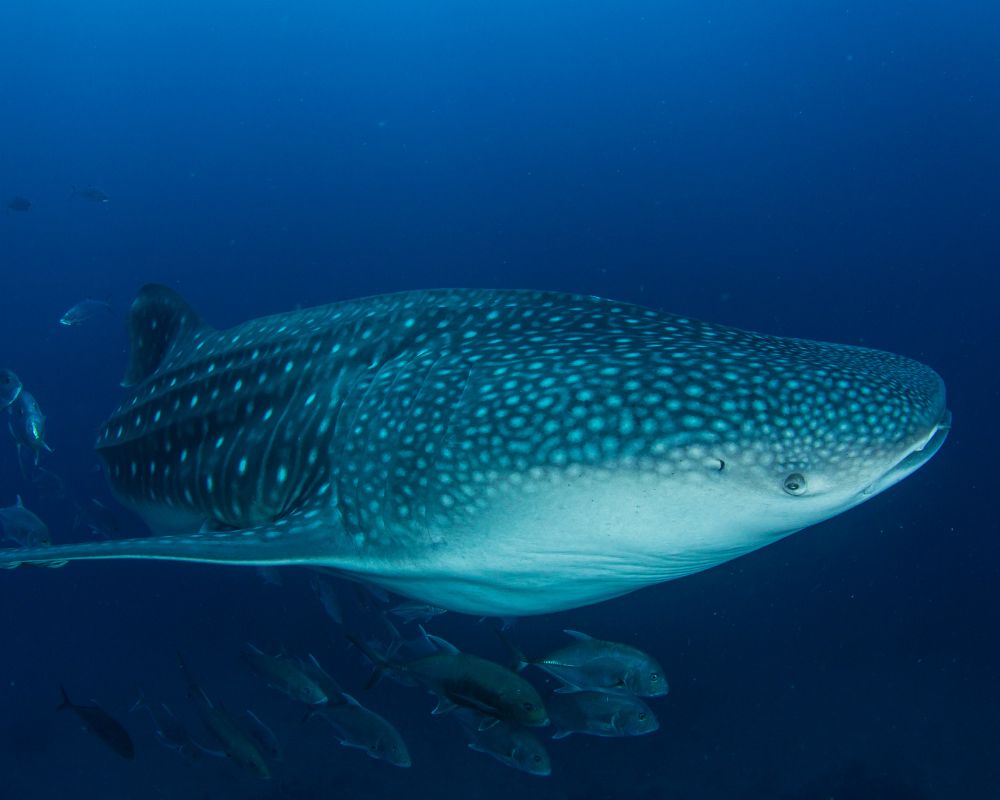Are you ready to dive into the world of whale sharks? These gentle giants of the ocean are fascinating creatures that capture the imagination of marine enthusiasts all over the world. But did you know that whale sharks are not only impressive in size and appearance but also in their parenting skills?
In this blog post, we’ll explore the little-known topic of how whale sharks care for their young. From reproduction to feeding and protection, we’ll delve into the intricacies of how these magnificent creatures ensure the survival of their offspring.
Whale Shark Reproduction

Whale sharks are unique in many ways, and their reproductive behavior is no exception. While they are known to mate in the wild, it’s not a common sight for humans to witness.
Explanation Of Whale Shark Mating Behavior
Male whale sharks are known to pursue female whale sharks for mating purposes. They have been observed following females for hours or even days, nudging and bumping them in an attempt to initiate mating. This behavior has earned male whale sharks the nickname “chasers.”
Once a male whale shark has successfully mated with a female, she can store the sperm for an extended period of time, even up to several months. This allows the female to delay fertilization until conditions are optimal for the development of her offspring.
Details On Female Whale Shark Pregnancy And Gestation Periods
Female whale sharks carry their young for an extended period of time, with gestation periods lasting up to 16 months. During this time, the developing offspring is nourished by the mother’s yolk sac until they are born.
Interestingly, female whale sharks can carry multiple embryos at once, although it’s uncommon for all of them to survive. It’s also worth noting that despite carrying multiple embryos, female whale sharks only give birth to a single pup at a time.
Birth and Early Life of Whale Shark Offspring
So, what happens once a female whale shark has carried her young for up to 16 months and the pups are ready to be born? Well, it’s quite a remarkable sight to see.
How Whale Shark Pups Are Born?
Whale shark pups are born alive, rather than hatching from eggs like some other shark species. During the birth process, the mother whale shark will position herself vertically in the water, with her head facing downwards and her tail pointing up towards the surface. This allows the newborn pup to swim away from her body and avoid getting caught in her fins.
Once the pup is born, it’s fully independent of the mother and is capable of swimming and feeding on its own. However, mother whale sharks still play an important role in caring for their young during the first few months of life.
How The Mother Whale Shark Cares For Her Offspring In The First Few Months Of Life?
In the early stages of a whale shark pup’s life, its mother provides it with vital protection and guidance. She’ll swim alongside her offspring, occasionally nudging it and helping it navigate through the water.
Another important aspect of early whale shark development is nutrition. While the pups are capable of feeding on their own, mother whale sharks will often regurgitate food for their young, providing them with a nutrient-rich meal that helps them grow and develop.
As the pups get older and more independent, they’ll gradually become less reliant on their mothers. But during those first few months of life, the bond between mother and offspring is essential for the survival of the young whale sharks.
Now that we’ve explored how whale sharks care for their young in the early stages of life, let’s take a closer look at their feeding and nutrition needs.
Feeding and Nutrition for Young Whale Sharks
Whale sharks are known to be filter feeders, but what exactly do their young eat? And how do they get the nutrition they need to grow and develop? Let’s dive in.
The Diet Of Juvenile Whale Sharks
As with adult whale sharks, the diet of juvenile whale sharks primarily consists of planktonic organisms, such as krill and small fish. However, as they grow and develop, their diet will gradually shift to include larger prey, such as squid and small crustaceans.
Juvenile whale sharks are also known to feed on small schools of fish, which they’ll often trap against the surface of the water using their large bodies.
How Mother Whale Sharks Provide Nutrition For Their Young
While juvenile whale sharks are capable of feeding on their own, mother whale sharks will often provide them with an additional source of nutrition. As mentioned earlier, mother whale sharks will occasionally regurgitate food for their young, providing them with a nutrient-rich meal.
In addition to regurgitation, mother whale sharks are also known to produce a milk-like substance that they’ll feed to their young. This substance is high in fat and protein, making it an ideal source of nutrition for growing pups.
Protection and Predators
Being a mother is a full-time job, especially when you’re a whale shark! Let’s take a closer look and the various dangers that face young whale sharks and how their mother protects them:
Mother Whale Shark Protection
Whale sharks may be massive creatures, but even they can fall prey to larger predators. So how do mother whale sharks protect their young from potential threats? Let’s find out.
1. Physical Protection
Mother whale sharks are fiercely protective of their young and will often use their large bodies to shield them from harm. When they sense danger, mother whale sharks will position themselves between their young and the potential threat, using their massive size as a barrier.
In addition to physical protection, mother whale sharks will also swim in a circular motion around their young, creating a protective barrier around them. This helps to deter potential predators and keeps the young whale sharks safe.
2. Camouflage
Another way that mother whale sharks protect their young is by using camouflage. Young whale sharks are born with a unique pattern of spots and stripes that helps to camouflage them in their natural environment. This makes them less visible to potential predators and increases their chances of survival.
Mother whale sharks also have the ability to change the color of their skin, which allows them to blend in with their surroundings. This makes it more difficult for potential predators to spot them and their young.
Threats To Young Whale Sharks
As with any young animal in the wild, young whale sharks face a number of threats to their survival. Let’s take a look at some of the potential dangers that these young creatures may encounter in their natural environment.
1. Predators
As we mentioned earlier, even the massive whale shark is not immune to predators. While adult whale sharks are relatively safe from most predators due to their size, young whale sharks are much more vulnerable. Potential predators include larger sharks, killer whales, and even some types of large fish.
2. Pollution
Pollution is a major threat to all marine life, and young whale sharks are no exception. Oil spills, plastic pollution, and other forms of contamination can have devastating effects on these creatures and their habitat. Pollution can also harm the plankton and small fish that whale sharks feed on, which can ultimately impact the survival of the entire population.
3. Fishing
Whale sharks are often caught in fishing nets and other fishing gear intended for other species. This can lead to injuries or death, as well as the accidental capture of young whale sharks. While some fishing practices have been altered to prevent this, it remains a threat to the whale shark population.
4. Climate Change
As our planet continues to warm, the ocean’s temperature and chemistry are changing, which can have a significant impact on whale sharks and their habitat. Changes in water temperature and acidity can affect the availability of food sources and alter migration patterns, which can ultimately impact the survival of young whale sharks and the entire population.
FAQs
How Long Do Whale Sharks Stay With Their Mother?
Whale shark offspring typically stay with their mother for around two years before they become independent.
Do Whale Sharks Carry Their Babies In Their Mouths?
No, whale sharks do not carry their babies in their mouths. Instead, they carry them in their womb until they are born.
Can A Baby Whale Survive Without Its Mother?
It depends on the age of the baby whale. While newborns rely heavily on their mother’s protection and nutrition, older juveniles are more independent and can survive on their own. However, without the support of their mother, their survival rate may decrease.

